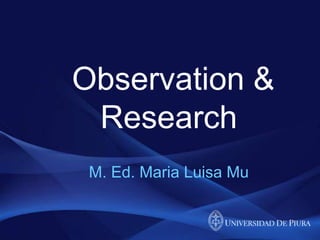
Classroom Research Methods & Approaches
- 1. Observation & Research M. Ed. Maria Luisa Mu
- 2. Research • A systematic process of inquiry consisting of three elements or components: 1. A question, problem, or hypothesis 2. Data 3. Analysis and interpretation of data
- 3. Variables • Independent variable: • The factors that the researcher manipulates in order to see what effect the changes introduced will have on the dependent variable. • Dependent variable: • The variable that changes or is influenced by the independent variable.
- 4. CLASSROOM RESEARCH THE TEACHER Beliefs, preparation, pers onality and individual characteristics THE LEARNER Social context and individual characteristics PROCESS VARIABLES LEARNING PROCESS ACQUISITION PROCESS Mental processes and learning strategies THE CLASSROOM Educational treatment of the curriculum, tasks and materials PRODUCT VARIABLES RESULTS / ATTAINMENT / COMPETENCE / PROFICIENCY Principles, concepts: grammar functions, cultural aspects… Procedures skills: listening, speaking, reading and writing Attitudes and values
- 5. Approaches to Research • Quantitative: • Research that yields numerical information that can be counted. (high intervention, objective behaviour and low inference) • Qualitative: • Information that can not be measured objectively (low intervention, subjective behaviour and high inference)
- 6. Approaches to Research • Eclectic : • A combination of experimental studies (more structured and controlled) with naturalistic/interpretative (less structured, less controlled) research.
- 7. Experimental approaches • Experiment: • A procedure for testing a hypothesis by setting up a situation in which the strength of the relationship between variables can be tested.
- 8. Types of experiments • True experiment: Consists of control and experiment groups to which subjects have been randomly assigned, and in which all subjects are tested before and after the intervention or treatment under investigation has been administered to the experiment group.
- 9. Types of experiments • Pre-experiment : has pre and post treatment tests, but lacks a control group. • Quasi-experiment : has both pre and post tests, and experiment and control groups, but no random assignment of subjects.
- 11. Where do we begin? • Start off with a general issue, a particular problem to think about. • Collect data and generate research questions and hypothesis or • Pose a hypothesis and collect data by reading reports of earlier classroom research and follow up those studies.
- 12. Instruments • Interviews: talking to the subjects • Questionnaires: responded anonymously • Case Studies: focusing on one or a few individuals for a long period of time. • Diaries: provide information about how learners feel and how they process information.
- 13. Issues in collecting Data • Triangulation: the value of multiple perspectives • Data triangulation: using a variety of sampling strategies • Investigator triangulation: more than one observer contributes to the findings • Methodological: using different methods to collect data. • Theoretical: analysing with different perspectives
- 14. Issues in collecting data • Reliability: • the extent to which an independent researcher, on analysing your data, would reach the same conclusions and a replication of your study would yield similar results.
- 15. Types of reliability • Internal reliability: the concistency of the results obtained from research . • External reliability: the extent to which independent researchers can reproduce a study and obtain results similar to those obtained in the original study.
- 16. Measuring reliability • To obtain reliability factors: • Statistical factors: test-retest, parallel forms, split-halves, - Cronbach, KR-20 Coefficient • Results should be between 0 ( less reliability) to 1 ( total reliability)
- 17. Issues in collecting data • Validity: • the extent to which you have really observed what you set out to observe, and the extent to which you can generalize your findings from the subjects and situations to other groups of subjects and situations.
- 18. Types of validity • Construct validity: • Construct: A psychological attribute that explains a phenomenon and that nees to be explained according to behaviour we can observe. • Content validity: to make sure that all the elements are included in the research
- 19. Types of validity • Criterion-validity: the validity of the instrument compared with an external criteria. • Internal validity: or generalisability: the findings can be applied to other situations. • Measuring validity: Factor analysis and interpretation.
- 20. So what kind of research? • Experimental research aims to investigate a situation without changing it. It tries to globally understand the phenomenon. • Action research aims to bring about changes (for the better) in the specific situation being investigated. It looks for local solutions to local problems.
- 21. Action Research • A problem is identified • Data is collected to suggest a solution to the problem • Develop a plan of action • Act to implement the plan • Observe the effects of action • Reflect on these effects
- 22. How to make up instruments 1. List the variables 2. Revise the variable definitions and understand their meaning 3. Check how each variable is going to be measured according to validity, reliability, sample, feasibility, usability, etc. 4. Choose the instruments (already developed) with reported validity and reliability
